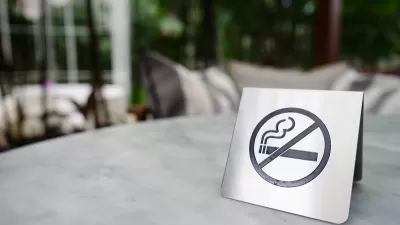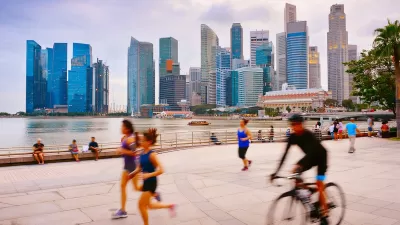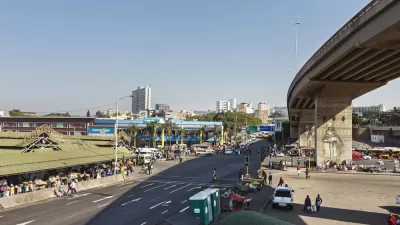Smoking is physically harmful to smokers and non-smokers alike, but what about its impact on public space? Nate Berg reports on a new paper in Urban Studies based on interviews in Singapore -- where smoking has been regulated since 1970.
The report by Qian Hui Tan of the Department of Geography, National University of Singapore, goes beyond studying issues related to the segregation of public spaces between smoking and non-smoking areas, though that is where she conducted many of the interviews that compose the study, to look at the impact of the odor on individuals themselves.
Berg writes, "The influence of smell, Tan argues, is perhaps one of the strongest determinants of how people interact with or avoid one another in the public sphere – whether it's cigarette smoke, days without a shower or the undeniable stench of vagrancy. How exactly cigarette smells shape the use of public space is likely different from place to place. But this research argues that smell and personal habits can be a major force in shaping city life."
As density becomes more accepted in residential living, and the shared spaces of the city become more crowded, are additional regulations needed to separate smokers from non-smokers? While Tan's research doesn't appear to delve in that direction, it is being considered more often, as shown by the Marin County, CA city of San Rafael's proposal "to ban smoking in more than 40 percent of the city's private residences or while sitting or standing on any sidewalk downtown."
Jennifer Gollan, writing for The Bay Citizen notes that "(t)he proposed ordinance would prohibit smoking tobacco or marijuana in any multi-family residential unit, condominium or apartment – more than 10,000 of the city's 24,000 dwellings....Violators could face fines ranging from $100 to $500, depending on the number of times they have been cited."
Thanks to The Atlantic Cities newsletters
FULL STORY: Even the Smell of Cigarettes Changes How We Use Public Spaces

Planetizen Federal Action Tracker
A weekly monitor of how Trump’s orders and actions are impacting planners and planning in America.

Maui's Vacation Rental Debate Turns Ugly
Verbal attacks, misinformation campaigns and fistfights plague a high-stakes debate to convert thousands of vacation rentals into long-term housing.

Restaurant Patios Were a Pandemic Win — Why Were They so Hard to Keep?
Social distancing requirements and changes in travel patterns prompted cities to pilot new uses for street and sidewalk space. Then it got complicated.

In California Battle of Housing vs. Environment, Housing Just Won
A new state law significantly limits the power of CEQA, an environmental review law that served as a powerful tool for blocking new development.

Boulder Eliminates Parking Minimums Citywide
Officials estimate the cost of building a single underground parking space at up to $100,000.

Orange County, Florida Adopts Largest US “Sprawl Repair” Code
The ‘Orange Code’ seeks to rectify decades of sprawl-inducing, car-oriented development.
Urban Design for Planners 1: Software Tools
This six-course series explores essential urban design concepts using open source software and equips planners with the tools they need to participate fully in the urban design process.
Planning for Universal Design
Learn the tools for implementing Universal Design in planning regulations.
Heyer Gruel & Associates PA
JM Goldson LLC
Custer County Colorado
City of Camden Redevelopment Agency
City of Astoria
Transportation Research & Education Center (TREC) at Portland State University
Jefferson Parish Government
Camden Redevelopment Agency
City of Claremont





























